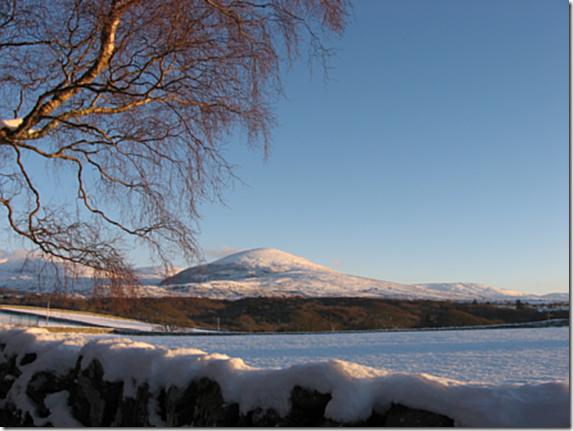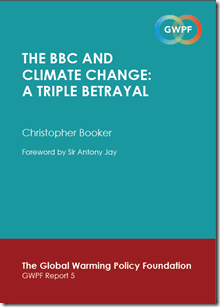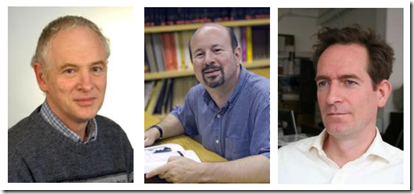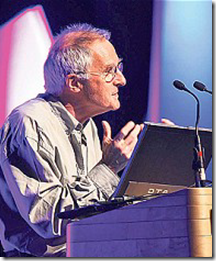 View from our garden gate, Christmastime last year
View from our garden gate, Christmastime last year
A very merry Christmas and a happy New Year to everyone
 Today, Christopher Booker, Telegraph columnist and author of The Real Global Warming Disaster will be launching a report he has written for the Global Warming Policy Foundation called The BBC and Climate Change: A Triple Betrayal. I implore anyone who is interested in the strange story of how the British public was sold the idea that anthropogenic climate change is threatening the future of the planet to read it.
Today, Christopher Booker, Telegraph columnist and author of The Real Global Warming Disaster will be launching a report he has written for the Global Warming Policy Foundation called The BBC and Climate Change: A Triple Betrayal. I implore anyone who is interested in the strange story of how the British public was sold the idea that anthropogenic climate change is threatening the future of the planet to read it.
I saw a draft of the report a little while ago because Booker has used a great deal of the information that Andrew Montford and I have uncovered about the BBC’s unhealthily close and cordial relationship with climate activism. This is very satisfying for us as we have long believed that this is a scandal that needs to be confronted and given a good public airing. Hopefully that will now happen.
However this new GWPF report also contains much that is new to me, and Christopher Booker has obviously cast his net very widely in order to gather together incontrovertible evidence that our revered national broadcaster has strayed far beyond the statutory limitations imposed on its activities so far as impartiality is concerned. Furthermore, the author is scathing about what happened when the BBC Trust set up a review to supposedly consider the accuracy and impartiality of the Corporation’s science coverage. Their chosen author – a self confessed ‘media tart’ with close links to the BBC – ignored evidence that should have been at the heart of his deliberations. This was provided in a submission that Andrew Montford and I provided him with, and this document now forms the core of Christopher Booker’s indictment of the BBC and the science review.
By chance, new evidence of the BBC Trust’s very strange behaviour when climate change is in the frame has just come to light. This concerns their oft repeated claim that the Jones Review was a ‘routine’ exercise and quite unrelated to Climategate and the welter of criticism, led by the blogoshere, of the BBC’s routinely partisan reporting of the climate debate. It would seem that the Trust has not been altogether truthful.
When Andrew and I originally wrote to the then chairman of the BBC Trust’s Editorial Standards Committee, Professor Richard Tait, suggesting that we should contribute to their recently announced review of science coverage, we said:
 It’s always reassuring to think that, whatever their opinions might be, Environment Correspondents on the leading national broadsheets are really up-to-speed with the basics of highly contentious subjects like climate change. Now there’s Louise Gray of the Daily Telegraph for example, who’s been covering the subject for years. Surely we can feel confident in the factual content of her reports, can’t we?
It’s always reassuring to think that, whatever their opinions might be, Environment Correspondents on the leading national broadsheets are really up-to-speed with the basics of highly contentious subjects like climate change. Now there’s Louise Gray of the Daily Telegraph for example, who’s been covering the subject for years. Surely we can feel confident in the factual content of her reports, can’t we?
But this afternoon I saw a reprint of a Telegraph article about the Durban Summit under Ms Gray’s by-line at the Global Warming Policy Foundation, and this is the opening paragraph below the sub-heading:
The Lib Dem minister, who is responsible for climate change, will arrive at UN talks in Durban, South Africa, today to lead the charge for an international deal to stop global temperatures rising above 35.6F (2C). (GWPF)
Oh Dear! But fear not, some eagle eyed newshound at the Telegraph has been hard at work saving their ace environment reporter’s blushes, because this is what I found when I checked out the story at their website.
The Lib Dem minister, who is responsible for climate change, will arrive at UN talks in Durban, South Africa, today to lead the charge for an international deal to stop global temperatures rising by more than 3.6F (2C). (Telegraph)
Perhaps as well as changing that very embarrassing piece of copy, the Telegraph should consider changing it’s Environment Correspondent.
(I’m very grateful to Geoff Chambers for this post. He seems to have spotted something that others haven’t: TonyN)

You’re a group of top scientists, showered with funding and honours – even a small share in the Nobel Peace Prize – and engaged in a “Cause” (that’s how you describe it) which you are convinced is of vital importance for the future of the planet.
But there are people opposed to your Cause – other scientists who disagree with your findings. They are to be the subject of a major TV documentary film. The film-makers ask you to reply, defending your Cause. What do you do?
Now read on:
(I’ve been waiting to post this since mid-afternoon, but the site has been down. Very frustrating)
There is a very big story breaking at WUWT and JefId’s.
Apparently another 5000 Climategate emails have been released on the net, with 220,000 more (yep! I counted the noughts) being withheld meantime.
From what I can see of the snippets that are floating around already, they look genuine, but these excerpts are very short and obviously lacking context, so it would be a mistake to read too much into them.
Since the last time this happened, a scandal over telephone hacking by Rupert Murdoch owned newspapers has broken in the UK. The establishment had little trouble whipping up a full-scale judge-led inquiry – complete with a barrister to ask witness giving evidence under oath difficult questions – in next to no time. Could this have been in order to ensure that the focus of attention remains on telephone hacking rather than on awkward questions about how political parties have courted, and curried favour with, the Murdochs for decades?.
If this really is Climategate2, then the blogosphere should do whatever is necessary to ensure that the same the establishment cannot avoid exerting the same degree of diligence in establishing just what is happening in the climate science community. That includes legal direct action.
This time there has to be a proper judicial enquiry, and it has to have access to everything on UK bases mail servers that could possibly be relevant to the way climate science, and the IPCC process, is being practiced this country.
 For most of last week, over at Bishop Hill Andrew Montford has been unearthing increasingly disturbing evidence of the degree to which the BBC is in bed with environmental advocacy groups. This has resulted in an outburst from Dr Joe Smith, an environmental activist and lecturer at the Open University, on his citzen joe smith [sic] blog.
For most of last week, over at Bishop Hill Andrew Montford has been unearthing increasingly disturbing evidence of the degree to which the BBC is in bed with environmental advocacy groups. This has resulted in an outburst from Dr Joe Smith, an environmental activist and lecturer at the Open University, on his citzen joe smith [sic] blog.
The cause of friction is Andrew’s discovery that Dr Smith acted as an adviser on some of the programmes that a recently published BBC Trust report identified as being sponsored by interested parties without the audience being made aware of the fact. It’s a bit like screening a programme that extols the health benefits of organic food without mentioning that the production costs were very kindly paid by the Soil Association and a leading supermarket chain that specialises in stocking organic products.
There is legislation in place – the Communications Act 2003 in particular – that makes deceiving audiences in this way illegal, and with very good reason.
Of course the BBC claim that they knew nothing of such things, and have been misled by the production companies, but Andrew’s digging increasingly calls this into question. He is also linking this scandal with the revelations that we have both worked on concerning the activities of Roger Harrabin, the BBC’s Envionment Analyst, and a very shadowy operation called the Cambridge Media and Environment Programme (CMEP). Regular readers of this blog will probably remember Dr Smith as one of the co-Directors of CMEP. The other co-Director is Roger Harrabin.
CMEP was set up by Smith and Harrabin for the purpose of organising seminars that would bring together environmentalists and broadcasters, no doubt for their mutual benefit.
Over the last several years, Andrew and I have pieced together quite a lot of information about CMEP, and in particular the extraordinary impact of a seminar that was held at Televison Centre in January 2006 . The BBC claim that this event mustered thirty of “the best scientific experts” to provide BBC executives with “an understanding of the existing state of knowledge on the issue of climate change”. Subsequently the BBC has refused to name “the best scientific experts” that Smith and Harrabin laid on for the occasion, but an eye-witness account from Richard D North states unequivocally that the experts present were actually environmental activists.
It is hardly surprising, therefore, that this seminar led directly to an editorial decision to marginalise climate sceptics so far as BBC output was concerned. That decision has had a far reaching impact on the presentation of the climate debate, which becomes more and more evident.
So what has Dr Smith got to say now in response to Andrew’s latest probing?
Well with crass arrogance, he starts out like this:
An apology to my regular reader/s. This is going to be very dull, but I’m aware of some comments over at Bishop Hill blog that require correction.
Dr Smith then goes on to explain that the CMEP programme of seminars has ended after 15 years. Apparently the last of the annual events was in 2009. What Dr Smith does not do is say why they have ended, which seems rather strange when he spends the rest of his post claiming that his and Roger Harrabin’s activities in connection with CMEP have been beyond criticism.
For this purpose, he reprints some notes on the CMEP Real World Seminars he says he produced “in reply to a query from Tony Newbery in July 2009”. Actually I did not ‘query’ Dr Smith, but got a message from DEFRA, who were dealing with an Freedom of information request of mine, that he wanted to send me a document called Real World Seminars. I contacted him as requested and this led to a lively exchange of emails that I’ll put up in another post.
The submission that Andrew and I made to Professor Steve Jones’ ludicrously partisan review of the BBC’s scientific output takes a very different view of events from that set out in Dr Smith’s Real World Seminars. Anyone who is not familiar with the very disturbing evidence that we presented might like to have a quick look here
Although our submission to the review was not made until October 2010, we had made it clear to the BBC Trust in April of that year that we wanted to provide some input. The BBC could not have failed to be aware of what was in store, given the material that had appeared on both our blogs and the various requests that we had made to the BBC Trust for information under the terms of the Freedom of Information Act.
It really would be very interesting to know why the seminar programme, and presumably CMEP too, hit the buffers at this particular time. Could it possibly be related in any way to the fact that around the same time Roger Harrabin more or less disappeared from BBC broadcast output?
Life is full of little mysteries, but I know that I will be wasting my time if I ask the BBC about all this. Perhaps Dr Smith will provide an answer.
In the meantime, the cavalry might be about to charge to the rescue.
Just when the mandarins who control the BBC’s factual output – news and documentaries – probably thought that they had engineered themselves into an new era when they could relax, it looks as though the world is about to fall on their heads.
If they expected the Jones report would herald a period of cosy complacency, when they could ignore those pesky critics in the blogosphere who ask awkward questions and dig out horribly embarrassing snippets of information, they were mistaken.
The story of CMEP, and the new information that Andrew seems to be adding almost daily about sponsored programmes broadcast by the BBC, has a long way to go yet.
Read Christopher Booker’s column in the Sunday Telegraph tomorrow.
and also David Rose in The Mail on Sunday. (See update below)
UPDATE 21/11/2011 08:45: Dr Joe Smith has contributed a long comment in response to this post here
UPDATE 21/11/2011 12:45: Andrew Montford informs me that David Rose’s article in the Sunday Mail about CMEP has been taken down from their website because of a complaint from Roger Harrabin.
UPDATE 22/11/2011 09:30 David Rose’s Harrabin story in the The Mail on Sunday is back on their website.
What follows is a comment that Alex Cull posted on the New Statesman thread. It seems far too good to languish there:
Alex Cull Says: November 14th, 2011 at 10:29 pm Here’s a link to a very recent interview on ABC’s [Australian Broadcasting Corporation] Science Show (audio is available and they should have a transcript up within a few days) with Robyn Williams talking to Lord Krebs, zoologist, Principal of Jesus College Oxford and member of the CCC [Climate Change Committee].
Lord Krebs: How are we going to decarbonise the electricity supply? The answer is there is no one magic bullet. What you need is a portfolio of renewables – particularly, in the UK, offshore wind because we are lucky, we’ve got a very windy shoreline, some onshore wind, although the NIMBYs (the not-in-my-back-yard brigade) tends to slow that down, there’ll be a small amount of wave and tidal power, and nuclear will have a significant role to play.
No mention about the growing concerns re the cost (a minor detail, it seems – what’s a mere Mars-mission equivalent here or there, after all?) Indeed, what Lord Krebs also appears to be saying is that not only will we have to totally “decarbonise” the economy, but we will need to be persuaded to ditch the idea of economic growth as well (which raises, does it not, a double question mark over how all this massive decarbonisation is to be paid for, at the end of the day.)
Lord Krebs: …and I think we do need, in the longer term, to get used to the idea of a different model from the model of continuous economic growth for ever and ever. It just isn’t sustainable.
Robyn Williams: So that’s a question of changing people’s behaviour, which is always a challenge. How do you do that?
Lord Krebs: It’s a matter of changing politicians’ behaviour. But the politicians, at least in a democratic society, are there because the people put them there. So if the electorate sent a signal to the political classes – “We don’t want a model of forever getting richer, forever using more resources, forever plundering the environment” – then I expect the politicians would change their pitch. So it is, in the end, about changing people’s behaviour and people’s aspirations. And that’s a really difficult nut to crack. When we think of the scientific contribution to problems such as global warming or food security, we tend to think of the technological aspect of science, the biological sciences, physics, engineering, chemistry, and so on. But actually, in my view, the behavioural sciences have got a huge contribution to make, here, in trying to understand how we change people’s norms, people’s expectations, and people’s aspirations.
Notice how this shifts from changing politicians’ behaviour (we, the electorate, doing this by exerting our democratic rights), seamlessly to changing the electorate’s behaviour (but then there’s a riddle – who will need to change our behaviour, so we can then change the politicians’ behaviour?)
Lord Krebs: But going back to the fundamental question of “Can we change people’s aspiration and people’s expectation?” I think this is a really interesting area for research. The people who probably know most about it are, of course, the marketing people, because they know how to get us to expect to be able to buy new stuff, whether it’s an iPhone or a new item of clothing, because of this year’s fashion. So we ought to be able to take their skills and their knowledge and turn it to a different purpose, to get people not to expect to have the latest gadget, the latest styles of clothing but to realise they’re perfectly happy with what they’ve got.
Robyn Williams: Who would pay for that advertising campaign?
Lord Krebs: That’s a very tricky one, who would pay for it.
Robyn Williams: If it’s the government, then the old “nanny state” accusation comes in.
Lord Krebs: There’s always a risk of “nanny state”, and I think that again is really part of the problem, of who ultimately takes responsibility.
I’m wondering if Lord Krebs might have actually already provided an answer to the riddle. “So we ought to be able to take their skills and their knowledge and turn it to a different purpose, to get people not to expect to have the latest gadget…” etc. Who’s this “we”?
For those who have not come across his lordship before, he first come to public attention, and earned his ennoblement, by heading the Food Standards Agency. One of his sillier contributions at that time was an attack on the organic food movement. He is now – God help us! – chairman of the House of Lords Science and Technology Committee. In real life, he is a world expert on the behaviour of birds.
That such an influential figure should seriously suggest that the same people who have managed to convince us that supermarkets sell good food and that its sensible to buy such shoddy goods that that they need frequent replacement are just the people to sell climate change – when scientists, politicians and activists have failed – is bizarre. But it is Krebs extraordinary confusion about the role of politicians and their electorates in a free society that really amazes. Is it surprising that the general public is becoming more and more suspicious about what scientists tell them?
Before saying any more about Professor Steve Jones’ BBC Trust Review of the Impartiality and Accuracy of the BBC’s Coverage of Science, I should probably own up to not having read the whole report. It runs to over a hundred pages, much of which deals with areas of science that I am not particularly interested in. More importantly perhaps, by the time I had read the one part of the report that considers issues I am very familiar with, I had doubts as to whether the rest was likely to be worth reading.
There are a few basic requirements for any kind of review: objectivity, accuracy, breadth of outlook, the willingness to consider even unwelcome material, clarity and precision when writing up the findings. All of these are essential if the end product is to have any kind of credibility, and all of these are lacking in the parts of the Professor Jones’ work that I have examined.
Only a fairly small section of this report – less than ten pages – focuses specifically on climate change, although this subject seems to be the elephant in the room throughout the introductory sections, which I have only skimmed through. Climate change is, without question, the most important, the most controversial, and most testing scientific issue that the BBC has had to report during the last decade. One might have expected that rather more space would have been devoted to detailed consideration of such an important topic.
If this rather bulky submission wasn’t enough to inflict on readers, there is also an appendix of similar length presenting Imperial College London’s Content Analysis of BBC the BBC’s Science Coverage. This is a terrifyingly dry looking document, but I did catch sight of a familiar name on the title page.
One of the author’s of this paper is Alice Bell, a specialist in the sociology or education and science communication at Imperial who I once had a very minor run-in with on her blog in connection with the ‘Bedtime Story’ climate scare advertising campaign launched by DECC in the run-up to the Copenhagen Conference in 2009. She had said, in passing, ‘I am in no way a climate change sceptic, in fact I find such people a bit worrying’. I suggested to her that I found social scientists who categorise ‘people’ as ‘a bit worrying’ because of a single opinion they hold with which you disagree might, just possibly, be ‘a bit worrying’ themselves. The point seemed to be lost on her. (Update: Alex Cull has an excellent comment about the Context Report and Alice Bell here.
Anyway, when I first had a look at Professor Jones’ report I did the obvious thing and turned straight to the part that deals with the submission that Andrew Montford and I made to his review. This is what he has to say about it:
 Steve Jones review of the impartiality and accuracy of the BBC’s coverage of science was published while I was out of the country and out of reach of the internet. Since I returned there has been a lot of catching up to do after a much longer holiday than usual, so as I was ‘a week behind the fair’ so far as the review was concerned anyway, I didn’t do more than glance at a copy online, shudder, and make a mental note to read it properly when there was plenty of time. As it happened this was fortunate, because the version of the review that the BBC posted on 20th July was not quite the final version.
Steve Jones review of the impartiality and accuracy of the BBC’s coverage of science was published while I was out of the country and out of reach of the internet. Since I returned there has been a lot of catching up to do after a much longer holiday than usual, so as I was ‘a week behind the fair’ so far as the review was concerned anyway, I didn’t do more than glance at a copy online, shudder, and make a mental note to read it properly when there was plenty of time. As it happened this was fortunate, because the version of the review that the BBC posted on 20th July was not quite the final version.
When I finally downloaded a copy this morning, I found this sad little note on the title page:
Clarification
On 8 August 2011 the Trust published an updated version of Professor Steve Jones’ independent review of the accuracy and impartiality of the BBC’s science coverage due to an ambiguity in the section on climate change. This reference was in the section on pages 71-72, immediately before Professor Jones discussed statements about climate change contained in two BBC programmes.
The Trust and Professor Jones now recognise that the passage as originally published could be interpreted as attributing statements made in those two programmes to Lord Lawson or to Lord Monckton. Neither programme specifically featured Lord Lawson or Lord Monckton and it was not Professor Jones’ intention to suggest that this was the case. Professor Jones has apologised for the lack of clarity in this section of his assessment, which has now been amended.
This is what the beginning of the paragraph straddling pages 71-72 looked like before 8th Aug:
The impression of active debate is promoted by prominent individuals such as Lord Monckton and Lord Lawson. The BBC still gives space to them to make statements that are not supported by the facts; that (in a February 2011 The Daily Politics show) 95% of the carbon dioxide in the atmosphere comes from natural sources, while in fact human activity has been responsible for a 40% rise in concentration, or (a November 2009 Today programme) that volcanoes produce more of the gas than do humans (the balance is a hundred times in the opposite direction).
And this is how it looked this morning:
The impression of active debate is sometimes promoted by statements that are not supported by the facts; that (in a March 2011 The Daily Politics show) 95% of the carbon dioxide in the atmosphere comes from natural sources, while in fact human activity has been responsible for a 40% rise in concentration, or (a November 2009 Today programme) that volcanoes produce more of the gas than do humans (the balance is a hundred times in the opposite direction).
One can well understand why Lords Lawson and Monckton would have been a bit miffed. I sincerely hope that someone at the BBC Trust had the grace to blush and apologise, but the ‘clarification’ they’ve provided sounds rather graceless and grudging. Perhaps its a bit difficult to face up to the fact that you’ve published a review of accuracy costing £140,000 which is not only inaccurate but probably libellous too.
Being the slowest site with the news in the whole of the blogosphere can occasionally have its advantages. Apart from the forgoing, which seemed to require an immediate airing, I’ll be posting again later today, or tomorrow, about Professor Jones extraordinary opus. So long after the event much has been said about this document, but there are quite a few things that haven’t been said yet that certainly still need saying. And I fear that there may need to be a bit more ‘clarification’. Accuracy just doesn’t seem to be Professor Jones’ thing.
UPDATE: 21/08/2011
Andrew Montford at Bishop Hill has followed the twists and turns of this story a bit further here and unearthed some other problems.
I have had two phone calls this afternoon from people who would be most likely to know what is happening in the long and immensely frustrating saga of getting our airfield up and running again. Both tell me that Kemble Air Services have at last received a certificate of lawful usage from the Snowdonia National Park Authority, and the airfield can now reopen. However it may be necessary for Kemble to obtain planning permission before private flying can take place as previous usage was by military and government contractor’s aircraft. Neither of the people I have spoken to seem to know precisely what Kemble’s plans are now.
Congratulations and thanks to all those who have helped to bring this about.
Recent Comments